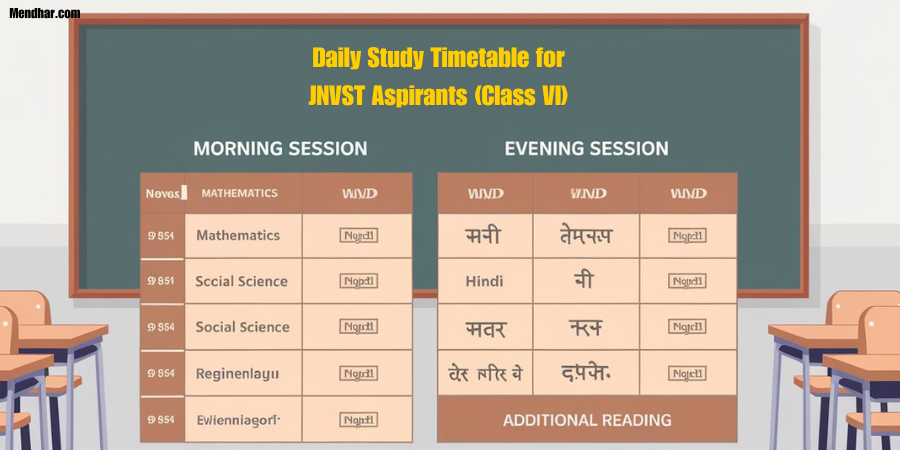Table of Contents
ToggleDaily Study Timetable for JNVST Aspirants (Class VI)

The Jawahar Navodaya Vidyalaya Selection Test (JNVST) is a gateway to quality education for talented students, especially from rural areas, seeking admission to Class VI. With limited seats and high competition, cracking the JNVST requires dedication, focus, and a well-structured study plan. A daily study timetable for JNVST aspirants (Class VI) is essential to cover the vast syllabus while balancing study, revision, and leisure. This blog will guide you on how to create and follow an effective daily schedule for JNVST preparation.
Why a Daily Study Timetable for JNVST Aspirants (Class VI) is Important
A carefully crafted daily study timetable for JNVST aspirants (Class VI) helps students organize their time efficiently. It ensures that every subject gets adequate attention and reduces the chances of neglecting weaker areas. Since the JNVST primarily focuses on Mental Ability, Arithmetic, and Language Skills, balancing all three components is crucial for success.
Additionally, a well-planned timetable helps in:
- Time Management: Dividing the day into focused study sessions ensures that no time is wasted.
- Consistency: Regular study sessions build discipline and habit, which is key for long-term retention.
- Stress Reduction: Knowing what to study and when minimizes last-minute cramming and exam anxiety.
- Confidence Building: Completing planned tasks boosts confidence and keeps motivation high.
To help JNVST aspirants (Class VI) achieve their goals, let’s explore a detailed timetable that ensures comprehensive preparation.
Detailed Daily Study Timetable for JNVST Aspirants (Class VI)
The following timetable is designed to cover all subjects while allowing time for relaxation and hobbies. Consistency and discipline are essential to make the most of it.
| Time | Activity | Description |
|---|---|---|
| 5:30 AM – 6:00 AM | Wake Up and Freshen Up | Starting the day early sets a positive tone and ensures more productive hours. |
| 6:00 AM – 6:30 AM | Exercise and Meditation | Light exercise and meditation improve focus, memory, and reduce stress, preparing you mentally. |
| 6:30 AM – 7:00 AM | Healthy Breakfast | A balanced breakfast with proteins, fruits, and whole grains provides sustained energy. |
| 7:00 AM – 8:00 AM | Mental Ability Practice | Dedicate this time to solving puzzles, logical reasoning questions, and mental math exercises. |
| 8:00 AM – 9:00 AM | Language Skills | Work on grammar, vocabulary, and comprehension. Practice reading and summarizing short passages. |
| 9:00 AM – 9:30 AM | Short Break | Take a break to relax. Go for a short walk or listen to soothing music. |
| 9:30 AM – 11:00 AM | Arithmetic Practice | Focus on mathematical concepts like basic operations, fractions, and problem-solving techniques. |
| 11:00 AM – 11:30 AM | Snack Break | Have a light snack to maintain energy levels. |
| 11:30 AM – 12:30 PM | Mock Test / Practice Papers | Attempt previous years’ papers or timed mock tests to improve speed and accuracy. |
| 12:30 PM – 1:00 PM | Lunch | Eat a nutritious meal rich in vegetables, proteins, and carbohydrates for sustained energy. |
| 1:00 PM – 2:00 PM | Nap or Leisure Time | A short nap or engaging in a hobby rejuvenates the mind and improves focus. |
| 2:00 PM – 3:00 PM | Revision | Revise the morning’s topics to reinforce learning and improve retention. |
| 3:00 PM – 4:00 PM | Fun Activity or Outdoor Play | Engage in outdoor games or hobbies to relax and stay physically active. |
| 4:00 PM – 5:00 PM | Homework and Doubt Clearance | Review school assignments and clarify doubts with teachers or peers. |
| 5:00 PM – 6:00 PM | Evening Snack and Relaxation | Have a light snack and unwind before resuming studies. |
| 6:00 PM – 7:00 PM | Mental Ability (Reinforcement) | Revisit challenging mental ability questions and practice new patterns. |
| 7:00 PM – 8:00 PM | Language Skills (Reading & Writing) | Read stories or articles and practice summarizing them to enhance comprehension and writing skills. |
| 8:00 PM – 8:30 PM | Dinner | A light dinner promotes better digestion and restful sleep. |
| 8:30 PM – 9:00 PM | Light Reading or Storytime | Reading storybooks or listening to bedtime stories helps relax the mind and improve language skills. |
| 9:00 PM – 5:30 AM | Sleep | A good night’s sleep of 8-9 hours is crucial for memory consolidation and cognitive function. |
Effective Study Strategies for JNVST Aspirants (Class VI)
- Active Learning: Engage in activities like self-quizzing, summarizing topics, and teaching others. Active recall is a powerful tool for retention.
- Topic Segmentation: Break down the syllabus into smaller chunks and tackle one topic at a time.
- Timely Revisions: Revise regularly. Schedule weekly revision sessions to revisit previously covered material.
- Practice Tests: Attempt mock tests in a simulated exam environment to improve time management and identify weak areas.
- Focus on Weak Areas: Allocate extra time to subjects or topics that need improvement.
Tips to Maintain Motivation and Focus
- Set Small Goals: Break your preparation into daily or weekly goals. Achieving these will keep you motivated.
- Reward Yourself: After completing a challenging task, reward yourself with a small treat or break.
- Stay Positive: A positive mindset can work wonders. Surround yourself with encouraging people and avoid negativity.
- Healthy Lifestyle: A healthy diet, regular exercise, and adequate sleep contribute significantly to cognitive performance.
Common Mistakes to Avoid
- Procrastination: Stick to the timetable and avoid delays in starting your study sessions.
- Neglecting Weak Areas: Focus equally on subjects you find difficult.
- Skipping Breaks: Breaks are crucial for maintaining productivity. Short, regular breaks can help refresh your mind.
- Overloading: Don’t cram too many topics in one day. Space out your learning to avoid burnout.
Conclusion:-
A daily study timetable for JNVST aspirants (Class VI) is the backbone of effective preparation. It not only helps in covering the syllabus systematically but also reduces stress and enhances confidence. By following the suggested timetable and adopting smart study strategies, students can maximize their chances of success in the JNVST exam. Remember, consistency, hard work, and a positive attitude are key. Stick to your plan, stay motivated, and success will be within your reach!


